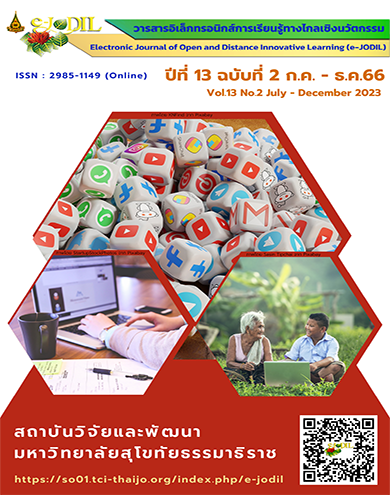ภาพสะท้อนของผู้มีส่วนได้เสียทางการศึกษาต่อการปรับกระบวนทัศน์ทางรัฐศาสตร์ ภายหลังสถานการณ์โควิด 19: กรณีมหาวิทยาลัยราชภัฏสุราษฎร์ธานี
Main Article Content
บทคัดย่อ
การวิจัยครั้งนี้มีวัตถุประสงค์เพื่อศึกษาภาพสะท้อนของผู้มีส่วนได้เสียทางการศึกษาต่อการปรับกระบวนทัศน์ทางรัฐศาสตร์ภายหลังสถานการณ์โควิด 19 กรณีมหาวิทยาลัยราชภัฏสุราษฎร์ธานี กำหนดกลุ่มตัวอย่างจากนักศึกษาหลักสูตรรัฐศาสตรมหาบัณฑิต มหาวิทยาลัยราชภัฏสุราษฎร์ธานี จำนวน 62 คน เก็บรวบรวมข้อมูลด้วยวิธีการสำรวจภาคสนามโดยใช้แบบสอบถามเป็นเครื่องมือและวิเคราะห์ข้อมูลด้วยสถิติเชิงพรรณนา ประกอบด้วย การแจกแจงความถี่ ค่าร้อยละ ค่าเฉลี่ยและส่วนเบี่ยงเบนมาตรฐาน ตลอดจนการระดมสมองจากคณาจารย์ ผู้บริหาร ตัวแทนเครือข่ายสถาบันอุดมศึกษาและตัวแทนนักศึกษา จำนวน 10 คน สำหรับเสนอแนวทางจัดการเรียนการสอนที่สอดรับกับบริบทร่วมสมัย
ผลการวิจัยพบว่า ความคิดเห็นของนักศึกษาต่อแนวทางดำเนินงานหลักสูตรรัฐศาสตรมหาบัณฑิตภายใต้สถานการณ์โควิด 19 ภาพรวมอยู่ในระดับมาก ( = 4.12, S.D. = 0.99) เรียงตามลำดับเป็นรายด้านดังนี้ ด้านการวางแผนนโยบายการบริหาร ด้านการพัฒนาผู้สอน/บุคลากร ด้านการประเมินผลการสอนและด้านการจัดการเรียนการสอน ขณะที่ข้อเสนอแนวทางการปรับกระบวนทัศน์การจัดการศึกษาทางรัฐศาสตร์จากภาพสะท้อนของกลุ่มผู้มีส่วนได้เสีย ภายหลังสถานการณ์โควิด 19 หลักสูตรรัฐศาสตรมหาบัณฑิตควรสร้างองค์ความรู้เชิงอำนาจซึ่งอยู่ภายใต้ขอบข่ายที่สัมพันธ์กับจุดยืนทางญาณวิทยาว่าด้วยกระแสและอิทธิพลของสื่อ สารสนเทศและเทคโนโลยีดิจิทัลทางรัฐศาสตร์ รวมทั้งปรับวิธีวิทยาวิเคราะห์ขอบข่ายเชิงเนื้อหาตามภูมิทัศน์การเมืองแบบใหม่ที่หลากหลายมากขึ้น
Downloads
Article Details

อนุญาตภายใต้เงื่อนไข Creative Commons Attribution-NonCommercial-NoDerivatives 4.0 International License.
บทความ ข้อความ ภาพประกอบ ตารางประกอบ ที่ตีพิมพ์ในวารสารเป็นความคิดเห็นและความรับผิดชอบของผู้เขียนแต่เพียงผู้เดียว ไม่เกี่ยวข้องกับมหาวิทยาลัยสุโขทัยธรรมาธิราชแต่อย่างใด
บทความที่เสนอพิจารณาในวารสาร e-JODIL ต้องเป็นบทความที่ไม่เคยส่งไปลงพิมพ์ เผยแพร่ หรืออยู่ระหว่างการพิจารณาของวารสารอื่น
กองบรรณาธิการขอสงวนสิทธิ์ในการพิจารณาและตัดสินการตีพิมพ์บทความในวารสาร
เอกสารอ้างอิง
กระทรวงการอุดมศึกษา วิทยาศาสตร์ วิจัยและนวัตกรรม. (2564). อว. "12 เดือน 12 ดี": ลดค่าเทอมสถาบันอุดมศึกษารัฐและเอกชน. สืบค้นเมื่อ 2 พฤศจิกายน 2564, จาก https://www.mhesi.go.th/index.php/all-media/video/4963-12-12-2.html
จันจิรา สมบัติพูนศิริ. (2562). ‘Digital Politics’ การเมืองใหม่ในโลกดิจิทัล. สืบค้นเมื่อ 22 ธันวาคม 2564, จาก https://www.the101.world/one-on-one-ep-37/
จอห์น แบร์โลว์. (มปป.). ความเป็นพลเมืองดิจิทัล: พลเมืองแห่งศตวรรษที่ 21. สืบค้นเมื่อ 11 ธันวาคม 2564, จาก https://thaidigizen.com/digital-citizenship/ch1-digital-citizenship/
ชาย โพธิสิตา. (2556). ศาสตร์และศิลป์แห่งการวิจัยเชิงคุณภาพ (พิมพ์ครั้งที่ 6). กรุงเทพฯ: อมรินทร์พริ้นติ้ง.
ปิยะวรรณ ปานโต. (2563). การจัดการเรียนการสอนของไทยภายใต้สถานการณ์การแพร่ระบาดของโรคติดเชื้อไวรัสโคโรนา 2019 (COVID–19). กรุงเทพฯ: สำนักงานเลขาธิการสภาผู้แทนราษฎร.
พระราชกำหนดการบริหารราชการในสถานการณ์ฉุกเฉิน พ.ศ.2548 (ฉบับที่ 22). (2564, 29 เมษายน). ราชกิจจานุเบกษา. เล่มที่ 138 ตอนพิเศษ 91 ง, หน้า 24-26.
รัตนะ บัวสนธ์. (2554). การวิจัยและพัฒนานวัตกรรมการศึกษา (พิมพ์ครั้งที่ 2). นครสวรรค์: หจก.ริมปิงการพิมพ์.
เรณุมาศ มาอุ่น. (2559). การจัดการเรียนการสอนในระดับอุดมศึกษาอย่างมีประสิทธิภาพ. Journal of Southern Technology, 9(2), 169–176.
สมพร หลิมเจริญ. (มปป.). การจัดการเรียนรู้ในสถานการณ์การแพร่ระบาดไวรัสโควิด 2019 (กรณี: ไม่ได้เรียนที่โรงเรียน). สืบค้นเมื่อ 11 ธันวาคม 2564, จาก http://www.sakonarea1.go.th/news_file/p60033381016.pdf
สุนีย์ ภู่พันธ์. (2546). แนวคิดพื้นฐานการสร้างและการพัฒนาหลักสูตร. กรุงเทพฯ: จุฬาลงกรณ์มหาวิทยาลัย
สุพรรณี บุญหนัก และธนวัฒน์ ชาวโพธิ์. (2564). การจัดการเรียนการสอนออนไลน์ของมหาวิทยาลัยมหามกุฏราชวิทยาลัย วิทยาเขตศรีล้านช้าง ในสถานการณ์แพร่ระบาดไวรัสโควิด - 19. วารสารสังคมศาสตร์บูรณาการ, 1(1), 58-64.
สำนักส่งเสริมวิชาการและงานทะเบียน มหาวิทยาลัยราชภัฏสุราษฎร์ธานี. (2564). สถิติจำนวนนักศึกษา มหาวิทยาลัยราชภัฏ สุราษฎร์ธานี ประจำภาคเรียนที่ 1/2564. สืบค้นเมื่อ 9 ธันวาคม 2564, จาก https://regis.sru.ac.th/2021/12/22/statistics_sru1-64/
อดุลย์ วังศรีคูณ. (2557). การศึกษาไทยในศตวรรษที่ 21: ผลผลิตและแนวทางการพัฒนา. วารสารมนุษยศาสตร์และสังคมศาสตร์ บัณฑิตวิทยาลัย มหาวิทยาลัยราชภัฏพิบูลสงคราม, 8(1), 1-17.
อภิรดี จิโรภาส และอัศว์ศิริ ลาปีอี. (2561). ประเมินหลักสูตรรัฐประศาสนศาสตรบัณฑิต คณะมนุษยศาสตร์และสังคมศาสตร์ มหาวิทยาลัยทักษิณ. สงขลา: มหาวิทยาลัยทักษิณ.
อานันท์ สีห์พิทักษ์เกียรติ, ศิริพร เพียรสุขมณี, พจนา พิชิตปัจจา และชัยวุฒิ ตั้งสมชัย. (2564). ถอดบทเรียนการจัดการเรียนการสอนในรูปแบบออนไลน์ในช่วงสถานการณ์การแพร่ระบาดไวรัส COVID-19 ของมหาวิทยาลัยเชียงใหม่. เชียงใหม่: ศูนย์นวัตกรรมการสอนและการเรียนรู้ มหาวิทยาลัยเชียงใหม่.
Habermas, J. (1992). The Structural Transformation of the Public Sphere: An Inquiry into a Category of Bourgeois Society. Cambridge: Polity Press.
Yamane, T. (1967). Statistics: An Introductory Analysis (2nd ed). New York: Harper and Row.
Yang, K., & Miller, G.J. (2008). Handbook of Research Methods in Public Administration (2nd ed). New York: Taylor & Francisgroup.


